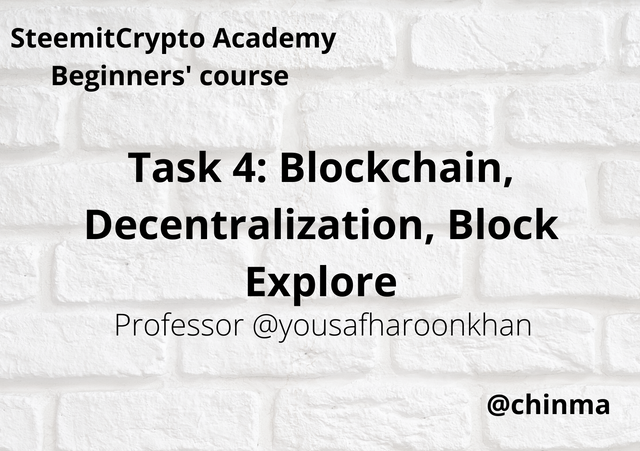(1) Write the definition of blockchain. And how our data on Blockchain is protected from hackers. ? And write details about Data, Hash and Previous Hash tag and explain through screenshot.
OR
(2) Define decentralization. Describe the advantages and disadvantages of a decentralized system. In what areas of life can a decentralized blockchain be helpful? (write in own words)
OR
(3) What is a block explorer? And what is its purpose and use? Search for different cryptocurrency block explorers and list them below. At least five different crypyo currencies. Also explore the transaction of a crypto coin on block explorer and explain with the help of screenshot.
%20(2).png)
Hello everyone. It's another season of the crypto academy and I am very excited to be writing on Blockchain, decentralization, and Block Explorer by @yousafharoonkhan.
Let's begin;

Decentralization is simply the opposite of centralization. It simply means distributing authority among members of a network or organization, so there's no one central authority. Authority is more distributed and they all have to function productively together following the rules set by them to grow together, as a network.
The Decision-making process is shared among members of the organization and a decision is reached from unanimous consent, not from a central source.

Advantages
- Faster growth, as everyone generally feels responsible for the progress of the network and works towards its progress.
- Decision-making process is faster: When members of a network are allowed to participate in the decision-making process, a consensus is reached faster rather than waiting for a central authority to decide what's best for the members and then pass the results of the decision down. This allows for faster results.
- Fosters excitement in participation: When people feel that they are not subject to one particular authority or have to submit to whatever rules a central authority makes but can create their rules themselves, there's generally more eagerness to participate in the network.
- There's less chance of the system giving problems to users: In a decentralized system, if an arm that controls the system goes bad or decides not to, it could lead to problems for users before it is rectified. A decentralized system however is designed in such a way that nobody is in charge and everyone is in charge. Therefore, if a certain group of nodes delays, another node can easily verify a transaction and the system keeps running smoothly.
- Room for creativity: When everyone in the system has a voice, the system would have a wide pool of creative ideas to choose from hence making room for better and smarter decisions by the system.
Disadvantages
- Sometimes, distributing decision power may lead to a lot of noise, and a general consensus could be difficult to reach as different people have different opinions and everyone wants their opinion to be chosen. This could slow down the growth process.
- Difficult to manage: Since there's no central authority to enforce rules and make sure they're followed, it may be a bit tricky, as people in the system are accountable to no one but themselves as an entity.
- Cost: Because the decision-making process is distributed, members involved in decision-making have to have a good knowledge of the system for the process to be scalable and they also have to be given enough incentive for their contributions. This could make the whole process quite costly.
- Scalability for smaller networks: For such a process to run as we have seen above, requires a lot of resources for the system to run successfully. This may not be attainable for smaller networks that can't afford the resources and finance needed to run such a system successfully.

- Civil service: The civil service system in Nigeria has been suffering from a lot of corruption as people high up in the system are accused of putting in people who have no technical know-how and they have the ultimate say-so people at the grassroots level are not given room to function properly and independently. If decentralization were to be introduced to the system, they would be forced to employ more capable hands, and then when everyone in the system is held accountable and have a voice, the civil service would definitely function better.
- Legal system: In Nigeria, this is the judiciary system of government. It is one area that decentralization would do very well. Decentralization of this sector could make for employment of much more capable people, reduction of constant intervention by people higher up because those in the lower hierarchy have no say and this could increase their willingness to interpret the law without fear of intervention.
- Banking: A lot of people are becoming increasingly grumpy with the fact that they have to put all their finance in charge of a central authority, who can track their funds, reverse transactions and sometimes in certain cases, confiscate their funds. Sometimes, transactions could be really slow and users don't have a say. It's one of the reasons why Defi protocols are becoming more widely accepted by the day. If the banking system is more decentralized, it would give room for faster transactions speeds, and users feel more in charge of their assets.

Decentralization eliminates the presence of a central authority and puts decision-making in the hands of its users. Recently, there's been a lot of growing interest in decentralization and in some areas like the blockchain, it seems to be working successfully. Although it has both its advantages and disadvantages, the idea shows a lot of prospects for the future.